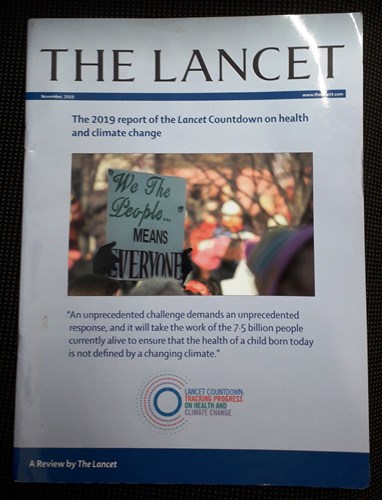
Launch of the Lancet Countdown Report 2019
16 January 2020
The red pill or the blue pill announced Morpheus to Neo in the classic science fiction film ‘The Matrix’.
Do you open your eyes to the stark harsh reality or be willfully blind and continue business as usual?
The 2019 Lancet Countdown on climate impact nudges us again to take the red pill and highlights that we (humanity) have two options; One option is that we carry on as normal, a business as usual scenario which will almost certainly result in a catastrophic 4 degree C increase in temperature. Or we can take concerted action now to keep the temperature rise under 2 degrees which will allow our species and many others to survive.
Despite the deepening science and evidence from all around us the business as usual approach has a stranglehold across most of our international, national and local policies and most of our personal and corporate behaviours.
In launching the report Richard Horton the Lancet Editor described climate change as the central crisis of our time, governments had so far failed and mass changes in behaviour are not apparent.
The impressive evidence and tracking of some 41 indicators by the Lancet countdown presents many of the health arguments for the need to change as well as holding a mirror up to our present situation. I urge all readers to look at the report and talk about it with colleagues and in your meetings. We all have a part to play in mitigating the impacts of climate change and creating the conditions for concerted action.
The report frames the impact of climate change through the lens of a child born today. We have the choice to decide our fate and that of today’s children and those not yet born (your future children, grandchildren, nieces and nephews).
The business as usual trajectory will result in a fundamentally altered world. The life of every child born today will be profoundly affected by climate change. Without accelerated intervention, this new era will come to define the health of people at every stage of their lives. It will see falls in food production, increased spread of disease, further harmful impact of air pollution, extreme weather heatwaves and stronger storms. All of which always affect the most vulnerable.
The second option adopts the Paris Agreement target of “holding the increase in the global average temperature to well below 2°C above pre-industrial levels and pursuing efforts to limit the temperature increase to 1·5°C.” In a world that matches this ambition, a child born today would see the phase-out of all coal in the UK and Canada by their sixth and 11th birthday; they would see France ban the sale of petrol and diesel cars by their 21st birthday; and they would be 31 years old by the time the world reaches net-zero in 2050, with the UK's recent commitment to reach this goal one of many to come. The changes seen in this alternate pathway could result in cleaner air, safer cities, and more nutritious food, coupled with renewed investment in health systems and vital infrastructure. This path is possible, and would transform the health of a child born today for the better, right the way through their life.
Hopefully there are some signs of social change 50% of people claim climate affects how they will vote, rising to 75% for the under 25, 63% of people support a green new deal.
Councils are declaring climate emergencies across West Yorkshire and concerted work on public engagement, reducing energy consumption and greater action on reducing impact of poor air quality can be seen.
The West Yorkshire ICS Population Health Board has put the climate emergency at the heart of its emerging plans. Acute trusts boards are beginning to ask for climate action plans.
Richard Horton argued that there had been a woeful response from the health sector to date but that opportunities were presenting themselves both through mass action such as extinction rebellion and the fact that Glasgow hosts the next climate change committee in 2020. These give us further opportunity to engage, argue and push for climate action.
Professor Hugh Montgomery used Ian Drury's classic ‘Reasons to be cheerful?’ line to highlight the direction our current policies were talking us. There is not much cheer from the science!
The world is continuing a business as usual approach willfully blind to its environmental and health consequences. The world has observed a 1°C temperature rise above pre-industrial levels, with feedback cycles and polar amplification resulting in a rise as high as 3°C in north western Canada.
Carbon dioxide emissions continuing to rise in 2018. Global fossil fuel consumption subsidies increased by 50% over the past 3 years, reaching a peak of almost US$430 billion in 2018.
The carbon intensity of the energy system has remained unchanged since 1990 and from 2016 to 2018, total primary energy supply from coal increased by 1·7%, reversing a previously recorded downward trend. Correspondingly, the health-care sector is responsible for about 4·6% of global emissions, a value which is steadily rising across most major economies.
Bold new approaches to policy making, research, and business are needed in order to change course. An unprecedented challenge demands an unprecedented response, and it will take the work of the 7·5 billion people currently alive to ensure that the health of a child born today is not defined by a changing climate.
My generation have been atrocious custodians of the planet; we are leaving the place far more degraded than the world we inherited.
Despite a clear awakening of the population partly due to the incredible efforts of the likes of Greta Thunberg the latest data does not give an encouraging picture.
Dr Van Hove from Doctors for Extinction Rebellion offers us an analogy: “Compare climate change to cancer. If a cancer treatment would give you 50 per cent survival rate if you acted now, but 20 per cent in a couple of years’ time, mountains would be moved to make earlier treatment happen. [But] on the climate, the enormous mobilisation we need just isn’t happening yet.”
Whilst the NHS long-term plan proposes a switch to low-emission vehicles and envisages a lot more healthcare professionals adopting physically active modes to transport in urban areas our ambition and action needs to be much greater.
There is still a chance to create a world [which will make] us all healthier. I am not sure we’ll win this fight but it’s worth a shot. I choose the red pill.
Paul Butcher is Director of Public Health at Calderdale Metropolitan Borough Council.
You can download the 2019 report here or watch the video here.

